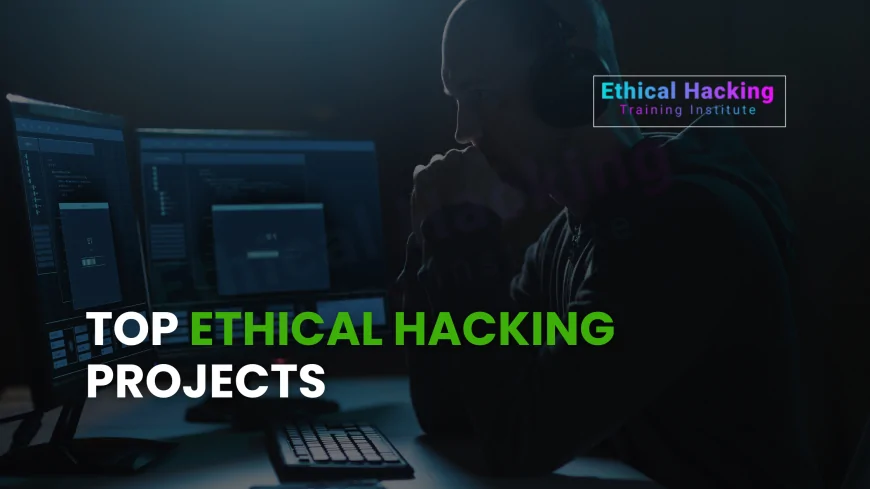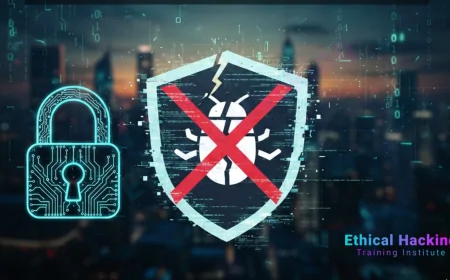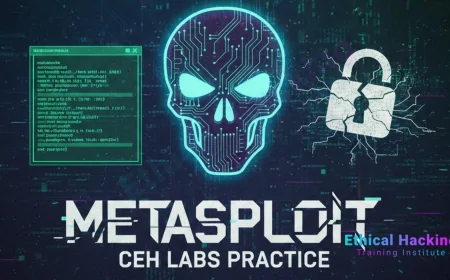Best Ethical Hacking Project Ideas for Students in Pune | Boost Your Cybersecurity Skills
Explore top ethical hacking project ideas for students in Pune, including penetration testing, keyloggers, network security, and more. Enhance your cybersecurity career with hands-on experience.

Ethical hacking is one of the most exciting and rewarding fields in the world of cybersecurity. As the demand for cybersecurity professionals continues to grow, students, especially those in Pune, can benefit from pursuing hands-on projects that showcase their practical skills in ethical hacking. These projects not only boost your understanding of various hacking techniques but also increase your employability by demonstrating your proficiency to potential employers. Whether you're a student pursuing a computer science or IT degree or someone looking to shift into cybersecurity, undertaking ethical hacking projects will provide invaluable experience.
In this blog, we will explore several ethical hacking project ideas that students in Pune can work on, helping you hone your skills, learn cutting-edge techniques, and stand out in the competitive field of cybersecurity.
What is Ethical Hacking?
Ethical hacking, also known as penetration testing or white-hat hacking, involves legally testing a computer system, network, or web application to identify vulnerabilities. Ethical hackers use the same tools and techniques as malicious hackers but do so to help organizations improve their security posture. This process helps detect weaknesses before they are exploited by cybercriminals.
For students in Pune interested in cybersecurity, ethical hacking offers a chance to delve into areas such as penetration testing, vulnerability assessment, security auditing, and malware analysis.
Why Should Students in Pune Focus on Ethical Hacking Projects?
Pune is a growing hub for IT and cybersecurity professionals, with numerous top-notch companies, cybersecurity training institutes, and tech startups. By working on ethical hacking projects, students can:
-
Build Real-World Skills: Academic knowledge is essential, but practical experience is crucial in cybersecurity. Projects help bridge the gap between theory and practice.
-
Improve Employability: Employers in Pune and beyond are looking for candidates with proven skills. A solid portfolio of ethical hacking projects can make you stand out during job interviews.
-
Gain Hands-On Experience: Ethical hacking projects provide hands-on experience with real tools, frameworks, and methodologies used by cybersecurity professionals.
-
Explore Cybersecurity Specializations: Whether you’re interested in penetration testing, network security, or ethical hacking frameworks, these projects allow you to explore various specializations in the field.
Top Ethical Hacking Project Ideas for Students in Pune
Here are some ethical hacking project ideas for students that will help you gain practical knowledge and showcase your skills:
1. Vulnerability Assessment of a Web Application
A web application is often the primary target for cyberattacks. For this project, students can create or choose an existing web application and perform a vulnerability assessment using tools like OWASP ZAP or Burp Suite. The goal is to identify common vulnerabilities such as SQL injection, cross-site scripting (XSS), and cross-site request forgery (CSRF), and provide recommendations for mitigating these issues.
Learning Outcomes:
-
Understanding web application vulnerabilities
-
Familiarity with common web security tools
-
Hands-on experience in penetration testing
2. Network Penetration Testing
For this project, students can set up a simulated network environment with multiple devices, routers, and firewalls. You can then attempt to penetrate the network using common hacking techniques such as Man-in-the-Middle (MITM) attacks, Wi-Fi cracking, and DNS spoofing. Using tools like Kali Linux, Metasploit, and Nmap, you can analyze and improve the security of the network.
Learning Outcomes:
-
Understanding network security protocols and flaws
-
Using penetration testing tools
-
Gaining skills in network sniffing, scanning, and exploitation
3. Building a Custom Keylogger
A keylogger is a type of malware that tracks the keystrokes of a user, often used by cybercriminals to steal passwords or sensitive data. For an ethical hacking project, students can build a simple keylogger and use it in a controlled, ethical environment to demonstrate how easily sensitive data can be intercepted. This project will help students understand the working of malicious software and ways to prevent it.
Learning Outcomes:
-
Insight into malware and keylogger techniques
-
Knowledge of anti-malware strategies
-
Understanding ethical hacking ethics
4. Setting Up a Honeypot System
A honeypot is a security resource designed to attract and trap attackers. In this project, students can set up a honeypot system to simulate a vulnerable server, network, or application. By monitoring the activities of the attackers who try to exploit this system, you can learn about their methods and behaviors, which will help in strengthening real systems. Tools like Honeyd and Kippo can be used to create a honeypot environment.
Learning Outcomes:
-
Understanding of cyberattack techniques and methodologies
-
Gaining experience in setting up monitoring tools
-
Analyzing real-world hacking tactics
5. Social Engineering Attack Simulation
Social engineering is one of the most common techniques used by hackers to exploit human weaknesses. This project involves designing a simulated social engineering attack, such as a phishing email, to test how easy it is for individuals to fall for scams. Students can experiment with different techniques to observe how attackers manipulate people into giving up sensitive information. Always conduct these experiments ethically and with proper consent.
Learning Outcomes:
-
Knowledge of social engineering tactics
-
Understanding the psychological aspect of hacking
-
Insights into user awareness and education for cybersecurity
6. Exploiting Buffer Overflow Vulnerabilities
Buffer overflow vulnerabilities are a common exploit used by attackers to gain control over a system. This project will require students to understand the concept of memory management and learn how attackers use buffer overflow techniques to execute arbitrary code on vulnerable systems. You can simulate this attack in a controlled lab using tools like GDB (GNU Debugger).
Learning Outcomes:
-
Understanding memory vulnerabilities and exploitation
-
Hands-on experience with debugging and reverse engineering
-
Insight into secure coding practices
7. Wireless Network Security Audit
Wireless networks are highly vulnerable to attacks if not properly secured. In this project, students can conduct a wireless network audit using tools like Aircrack-ng to crack weak passwords or Wireshark to capture and analyze traffic. Students can also experiment with setting up strong encryption protocols such as WPA3 to improve the security of wireless networks.
Learning Outcomes:
-
Understanding wireless security protocols and encryption
-
Using wireless hacking tools
-
Learning how to secure wireless networks
8. Cybersecurity Incident Response Plan
In this project, students can simulate a cybersecurity incident, such as a malware attack or a DDoS (Distributed Denial of Service) attack, and create an incident response plan. They will learn how to identify, contain, and resolve the attack while minimizing damage. This project will give students insight into handling real-world cybersecurity incidents.
Learning Outcomes:
-
Understanding incident response procedures
-
Gaining experience in cybersecurity management
-
Building communication skills for a security team
How to Approach Ethical Hacking Projects as a Student in Pune
-
Get Hands-On Experience: Many cybersecurity institutes in Pune offer labs and environments where students can practice ethical hacking techniques.
-
Use Virtual Environments: Virtual machines or platforms like Hack The Box and TryHackMe provide safe environments to practice hacking without risking real systems.
-
Document Your Work: Make sure to document each project, including methodologies, tools used, findings, and outcomes. A detailed portfolio will be beneficial for future job applications.
-
Stay Ethical: Always remember to seek permission before attempting any hacking activity on a live system. Ethical hacking requires adherence to legal and ethical guidelines.
Conclusion
Pune is an excellent city for students who are interested in pursuing ethical hacking projects. With the growing demand for cybersecurity professionals, students who work on projects such as vulnerability assessments, penetration testing, and building custom hacking tools will gain essential skills for a successful career. Whether you’re just starting your cybersecurity journey or looking to enhance your existing skills, these projects will help you build a solid foundation and stand out in the competitive job market.
FAQs
What is ethical hacking?
Ethical hacking involves legally testing a computer system or network to identify vulnerabilities that could be exploited by malicious hackers.
Why are ethical hacking projects important for students?
Ethical hacking projects help students gain practical, hands-on experience, enhancing their theoretical knowledge and boosting their employability in cybersecurity.
What are some ethical hacking project ideas for students in Pune?
Project ideas include penetration testing, network security audits, building keyloggers, setting up honeypots, and creating social engineering simulations.
What tools are used in ethical hacking projects?
Common tools used include Kali Linux, Metasploit, Wireshark, Nmap, Burp Suite, Aircrack-ng, and OWASP ZAP.
Can I start ethical hacking projects with no prior experience?
Yes, students can start with basic projects like network scanning or vulnerability assessments before progressing to more advanced tasks like penetration testing.
How do ethical hacking projects help in job placement?
Completing ethical hacking projects demonstrates real-world skills, making you a stronger candidate in the job market by showcasing your practical experience to potential employers.
Are ethical hacking projects safe to do?
Ethical hacking projects are safe when performed in a controlled, legal environment. Always ensure you have the necessary permissions before testing systems.
What are the benefits of learning ethical hacking?
Ethical hacking helps individuals understand cybersecurity threats, improve system defenses, and learn how to detect and prevent attacks.
Do I need programming knowledge for ethical hacking?
While programming knowledge is beneficial, it’s not mandatory. Basic understanding of scripting languages like Python can help, but ethical hacking skills can be learned without advanced programming.
What programming languages are useful for ethical hacking?
Languages like Python, C, C++, and JavaScript are commonly used in ethical hacking for automation, scripting, and web security tasks.
How do I set up a penetration testing environment?
To set up a penetration testing environment, use virtual machines (VMs) with tools like Kali Linux, which is specifically designed for ethical hacking.
What is a honeypot in ethical hacking?
A honeypot is a security mechanism that simulates a vulnerable system to attract and study hackers, providing insights into their tactics and behavior.
What is a keylogger in ethical hacking projects?
A keylogger is software that records keystrokes on a system, often used by attackers. Ethical hackers create keyloggers in controlled environments to understand how they work and how to prevent them.
What is buffer overflow in ethical hacking?
Buffer overflow is a vulnerability where a program writes more data to a block of memory than it can hold, potentially allowing hackers to execute arbitrary code.
What is social engineering in ethical hacking?
Social engineering involves manipulating people into disclosing confidential information. Ethical hacking projects may include designing phishing emails or testing human factors in security.
How can I build a cybersecurity portfolio with ethical hacking projects?
Document each ethical hacking project, including the problem, tools used, methods, and solutions. This portfolio will showcase your practical experience and skills.
How does ethical hacking relate to network security?
Ethical hacking helps identify and fix vulnerabilities in networks, making them more secure by simulating attacks that real hackers might attempt.
Can I practice ethical hacking without causing harm?
Yes, ethical hacking can be practiced in virtual environments like Hack The Box or TryHackMe, where no real systems are harmed.
What are Capture The Flag (CTF) competitions?
CTF competitions are cybersecurity challenges where participants solve puzzles related to hacking, cryptography, forensics, and other security tasks to earn points.
How can I secure wireless networks as part of an ethical hacking project?
You can perform security audits on wireless networks using tools like Aircrack-ng, which helps test the strength of wireless encryption protocols such as WEP and WPA2.
What is Metasploit, and how is it used in ethical hacking?
Metasploit is a penetration testing tool that helps ethical hackers exploit vulnerabilities in systems to test their security defenses.
What is Wireshark, and how can it be used in ethical hacking?
Wireshark is a network protocol analyzer that captures and inspects network traffic. Ethical hackers use it to analyze data packets and detect malicious activity.
Can ethical hacking be practiced on personal devices?
Yes, students can practice ethical hacking techniques on personal devices in a controlled manner. Just ensure that you do not violate any terms of service or legal boundaries.
What is the difference between white-hat and black-hat hackers?
White-hat hackers are ethical hackers who test and improve systems, while black-hat hackers are malicious individuals who exploit vulnerabilities for personal gain.
What is ethical hacking certification?
Ethical hacking certifications, such as CEH (Certified Ethical Hacker), validate an individual's skills and knowledge in ethical hacking techniques and cybersecurity.
How long does it take to complete an ethical hacking project?
The duration depends on the complexity of the project. Basic projects may take a few weeks, while more advanced projects could take a couple of months.
What is Kali Linux, and why is it used in ethical hacking?
Kali Linux is a Linux distribution specifically designed for penetration testing and security auditing. It contains tools for network scanning, vulnerability assessment, and exploitation.
How can I improve my ethical hacking skills?
To improve your skills, practice regularly in virtual environments, stay updated with the latest cybersecurity trends, and participate in ethical hacking challenges.
Is ethical hacking legal?
Ethical hacking is legal when done with permission. Always obtain consent from the owner of the system being tested to ensure compliance with laws.
How do I get started with ethical hacking if I'm a beginner?
Start with basic projects like vulnerability assessments or network scanning. Learn about common hacking techniques, tools, and best practices, and gradually move on to more advanced projects.
What are ethical hacking frameworks?
Ethical hacking frameworks, like NICE 2.0 or MITRE ATT&CK, provide structured guidelines and methodologies for conducting penetration testing and vulnerability assessments.
What career opportunities are available after completing ethical hacking projects?
After completing ethical hacking projects, students can pursue careers as penetration testers, security analysts, cybersecurity consultants, or ethical hackers.
What's Your Reaction?
 Like
0
Like
0
 Dislike
0
Dislike
0
 Love
0
Love
0
 Funny
0
Funny
0
 Angry
0
Angry
0
 Sad
0
Sad
0
 Wow
0
Wow
0
















